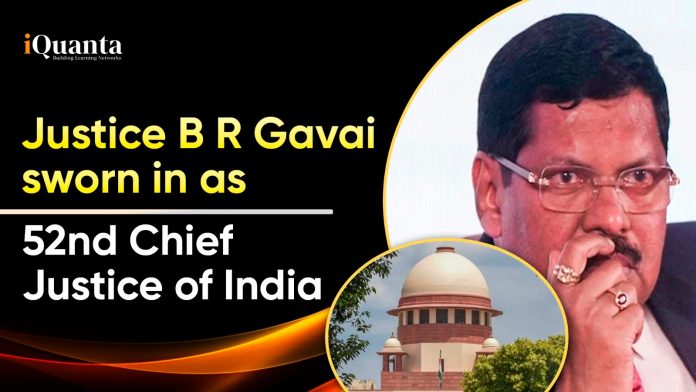The Chief Justice of India is also known as the Chief Judge of the Supreme Court of India. The chief justice is responsible to allocate cases and appoint constitutional benches to deal with important matters of law. Justice BR Gavai took oath as the 52nd Chief Justice of India on Wednesday (14th May). He is also the first Buddhist to lead the nation’s judicial system. The oath-taking ceremony was conducted by the President of India, Draupadi Murmu, for Justice Gavai. Other high professionals also attended the ceremony, such as Prime Minister Narendra Modi, Lok Sabha Speaker Om Birla, Home Minister Amit Shah, Defence Minister Rajnath Singh, as well as other judges of the Supreme Court and High Court. The former Chief Justice of India, Khanna, retired on Tuesday as the 51st Chief Justice of India. The Chief Justice is responsible for allocating work to the other judges as per Article 145 of the Constitution of India and the Supreme Court Rules of Procedure of 1966.

Journey of the New Chief Justice of India- BR Gavai
- BR Gavai was born on 24th November, 1960 in Amravati. His legal journey started on 16th March, 1985, and he has also worked with the late Bar. RajaS. Bhonsalee, a former advocate general and high court judge from 1987.
- He has also represented various autonomous organisations and corporations such as SICOM, DCVL, and other municipal councils across the Vidarbha region.
- From August 1992 to July 1993, Gavai also served as the Assistant Government Pleader and Additional Public Prosecutor at the Bombay High Court’s Nagpur Bench.
- He practiced at the Bombay High Court from 1987 to 1990 and also at the Nagpur Bench of the Bombay High Court. His expertise is in Constitutional and administrative law.
- He was appointed as the Government Pleader and Public Prosecutor for the Nagpur Bench on 17th January, 2000. He was promoted as the Additional Judge of the High Court on 14th November, 2003.
- On 12th November 2005, he was confirmed as the permanent judge of the Bombay High Court.
- He took charge of various types of cases at the Principal Seat in Mumbai and benches in Nagpur, Aurangabad, and Panaji.
- He was appointed as the Supreme Court Judge on 24th May, 2019.
- His retirement date is 23rd November, 2025.
Both judges of the Supreme Court and high courts, both present and retired, were present at the ceremony. It is expected that the chief justice will call a meeting of all the judges to discuss further details. Hardly 10 days are left before the court goes into the annual summer break. However, it will be partly working with a minimum of three benching hearing cases at a time.
List of Chief Justices of India
| Name | Start Date | End of Term |
| Harilal Jekisundas Kania | 26 January 1950 | 6 November 1951† |
| Mandakolathur Patanjali Sastri | 7 November 1951 | 3 January 1954 |
| Mehr Chand Mahajan | 4 January 1954 | 22 December 1954 |
| Bijan Kumar Mukherjea | 23 December 1954 | 31 January 1956‡ |
| Sudhi Ranjan Das | 1 February 1956 | 30 September 1959 |
| Bhuvaneshwar Prasad Sinha | 1 October 1959 | 31 January 1964 |
| Pralhad Balacharya Gajendragadkar | 1 February 1964 | 15 March 1966 |
| Amal Kumar Sarkar | 16 March 1966 | 29 June 1966 |
| Koka Subba Rao | 30 June 1966 | 11 April 1967‡ |
| Kailas Nath Wanchoo | 12 April 1967 | 24 February 1968 |
| M. Hidayatullah | 25 February 1968 | 16 December 1970 |
| Jayantilal Chhotalal Shah | 17 December 1970 | 21 January 1971 |
| Sarv Mittra Sikri | 22 January 1971 | 25 April 1973 |
| Ajit Nath Ray | 26 April 1973 | 28 January 1977 |
| Mirza Hameedullah Beg | 29 January 1977 | 21 February 1978 |
| Yeshwant Vishnu Chandrachud | 22 February 1978 | 11 July 1985 |
| Prafullachandra Natwarlal Bhagwati | 12 July 1985 | 20 December 1986 |
| Raghunandan Swarup Pathak | 21 December 1986 | 18 June 1989‡ |
| Engalaguppe Seetharamiah Venkataramiah | 19 June 1989 | 17 December 1989 |
| Sabyasachi Mukharji | 18 December 1989 | 25 September 1990† |
| Ranganath Misra | 26 September 1990 | 24 November 1991 |
| Kamal Narain Singh | 25 November 1991 | 12 December 1991 |
| Madhukar Hiralal Kania | 13 December 1991 | 17 November 1992 |
| Lalit Mohan Sharma | 18 November 1992 | 11 February 1993 |
| Manepalli Narayanarao Venkatachaliah | 12 February 1993 | 24 October 1994 |
| Aziz Mushabber Ahmadi | 25 October 1994 | 24 March 1997 |
| Jagdish Sharan Verma | 25 March 1997 | 17 January 1998 |
| Madan Mohan Punchhi | 18 January 1998 | 9 October 1998 |
| Adarsh Sein Anand | 10 October 1998 | 31 October 2001 |
| Sam Piroj Bharucha | 1 November 2001 | 5 May 2002 |
| Bhupinder Nath Kirpal | 6 May 2002 | 7 November 2002 |
| Gopal Ballav Pattanaik | 8 November 2002 | 18 December 2002 |
| Vishweshwar Nath Khare | 19 December 2002 | 1 May 2004 |
| S. Rajendra Babu | 2 May 2004 | 31 May 2004 |
| Ramesh Chandra Lahoti | 1 June 2004 | 31 October 2005 |
| Yogesh Kumar Sabharwal | 1 November 2005 | 13 January 2007 |
| Konakuppakatil Gopinathan Balakrishnan | 14 January 2007 | 11 May 2010 |
| Sarosh Homi Kapadia | 12 May 2010 | 28 September 2012 |
| Altamas Kabir | 29 September 2012 | 18 July 2013 |
| Palanisamy Sathasivam | 19 July 2013 | 26 April 2014 |
| Rajendra Mal Lodha | 27 April 2014 | 27 September 2014 |
| Handyala Lakshminarayanaswamy Dattu | 28 September 2014 | 2 December 2015 |
| Tirath Singh Thakur | 3 December 2015 | 3 January 2017 |
| Jagdish Singh Khehar | 4 January 2017 | 27 August 2017 |
| Dipak Misra | 28 August 2017 | 2 October 2018 |
| Ranjan Gogoi | 3 October 2018 | 17 November 2019 |
| Sharad Arvind Bobde | 18 November 2019 | 23 April 2021 |
| Nuthalapati Venkata Ramana | 24 April 2021 | 26 August 2022 |
| Uday Umesh Lalit | 27 August 2022 | 8 November 2022 |
| Dhananjaya Yeshwant Chandrachud | 9 November 2022 | 10 November 2024 |
| Sanjiv Khanna | 11 November 2024 | 13 May 2025 |
| Bhushan Ramkrishna Gavai | 14 May 2025 | Incumbent |

FAQs
The Parliament has the power to remove the Chief Justice of India as per the procedure established by Law.
The youngest Chief Justice of a High Court and the youngest judge of the Supreme Court is Justice Hidayatullah, elected on 20 July 1969.




